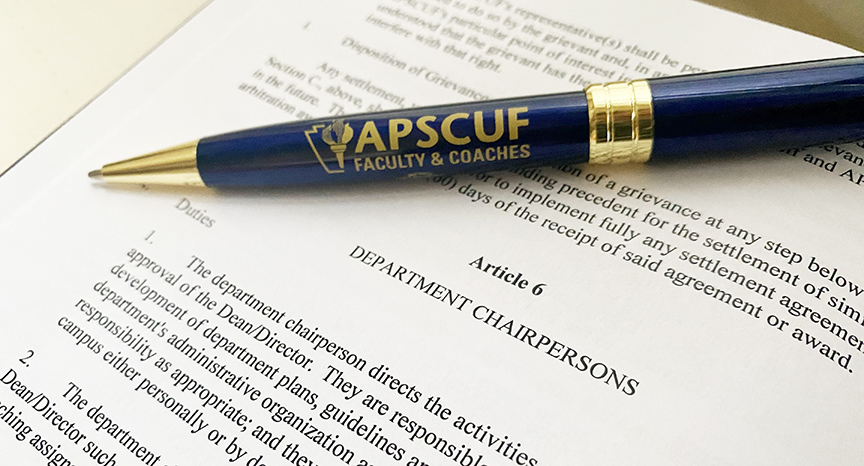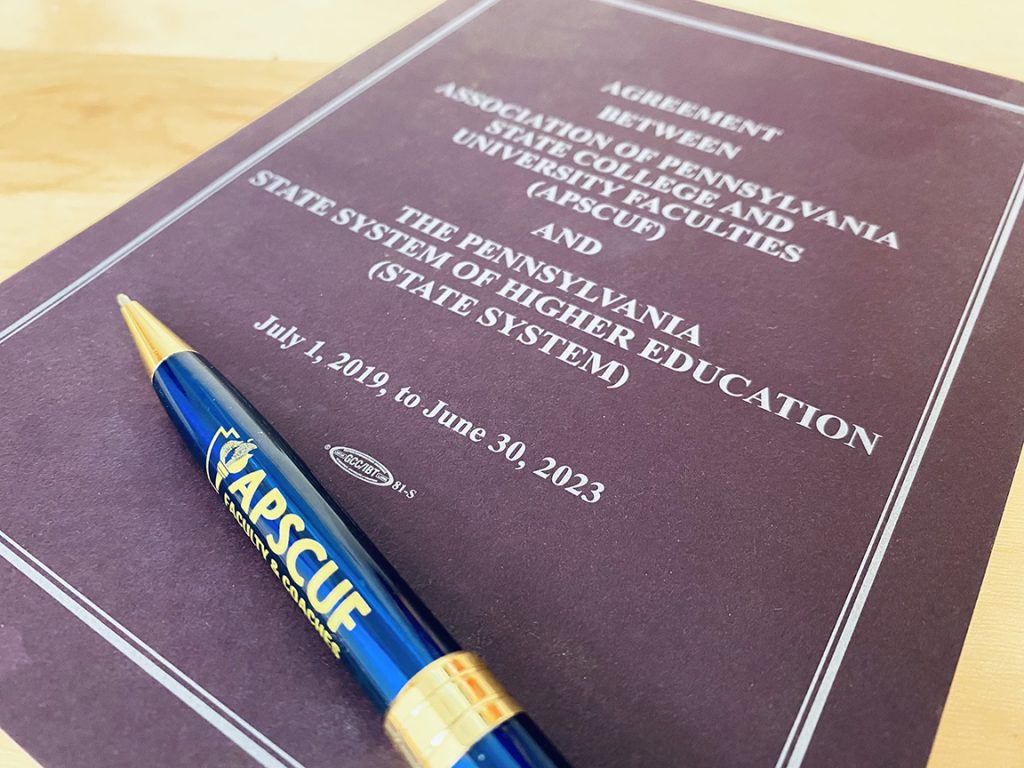Blog
See Dr. Kenneth M. Mash’s remarks to the Board of Governors – Feb. 16, 2023
The Feb. 16 Board of Governors meeting was streamed via YouTube. Below are APSCUF President Dr. Kenneth M. Mash’s comments as prepared.
Chair Shapira, governors, chancellor, presidents and guests.
My name is Ken Mash, and I am president of APSCUF — the Association of Pennsylvania State College and University Faculties — the union that represents the coaches and faculty at our 14 State System campuses.
Thank you for inviting me and members of our APSCUF team to join you at yesterday’s workshop; it was a most generous gesture. The workshop was informative and thought-provoking.
I don’t want to get ahead of anyone or your agenda, but I did want to share some of my thoughts. I have been at this for a long time now. I’m sure — from the perspective of some here — too long. But experience does have some benefit, even when it comes from the likes of me.
The best case made by your guests yesterday was that industry-recognized credentials help students when they graduate. I was very impressed with the numbers presented. Of course, given my profession and its tendency toward skepticism, we want to know more about it.
We would like to know, for example, if those numbers can be disaggregated. In other words, is the benefit true for all credentials, or do some of those credentials have a disproportionate impact on the overall numbers?
Among other things, we would be interested in knowing time frames. Is the advantage that students get from credentials a benefit over the long term, or do the benefits wane over time?
That’s not to poo poo the idea of credentialing. As I said before, I thought it thought-provoking, and we, APSCUF, do want to do what is best for our students and our universities. And, as President Driscoll mentioned yesterday, we also want to ensure quality.
Like many things, however, the devil is in the details. What are the costs in terms of money, time, relationships, energy, etc.? If it is about attracting students for stand-alone credentials — that is, potential students not seeking a degree — what is the competition? As the chair pointed out yesterday, “credentials” has become a higher-education buzzword, like others we have heard in the past. It is EVERYWHERE. It recurs at every conference and in every trade publication. Is the market flooded? Or will it be by the time we could get it up and running?
Are all of our universities even prepared to take on new projects when they might still be dealing with curricula questions stemming from consolidation, staff shortages, and other issues? What sort of problems can occur if we get out of our lane? (Yes, I think it was a fair question to ask.) It is also true that sometimes you can’t get ahead without changing lanes, but it is equally true that if everyone is changing lanes at the same time, an accident can keep you from moving at all. It is important for us to get where we need to go — but to do so with due caution.
Now I’m sure some of you are thinking: “There goes APSCUF again, being negative about everything.” But pointing out legitimate questions is not being negative; it is being inquisitive. It’s the type of thing that academic institutions are supposed to do. And just to be clear: We are not negative about it. We think it’s interesting and potentially exciting, especially if appropriately targeted. There is a difference, for example, between credentialing and industry-recognized credentials.
We, APSCUF, just want more information. And I hope that you do, too. Too often in the past — and this is where the experience kicks in — groupthink has permeated our university and System administrations, councils, and trustees, and that has had some very serious consequences. So I would encourage this board to ask questions and get all the possible facts before we dive in completely.
Further, we would encourage this Board and all of our administrations to turn to our faculty and coaches with open ears if they would like to hear truly novel ideas. You have many bright people working at your universities.
I very much appreciate your attention.
Faculty negotiations update – February 2023
 The Association of Pennsylvania State College and University Faculties and Pennsylvania’s State System of Higher Education have released a joint update about negotiations. Click here to read the release.
The Association of Pennsylvania State College and University Faculties and Pennsylvania’s State System of Higher Education have released a joint update about negotiations. Click here to read the release.
Students: Apply for APSCUF’s internship, scholarship

Photo/Pexels
Applications are open for APSCUF’s 2023 scholarship and summer internship.
Feb. 13 is the deadline to apply to our government/public-relations internship. Interested State System students can click here for the application packet and to read testimonials from past interns.
June 1 is the deadline to apply for our $3,000 state scholarship, open to relatives of APSCUF or APSCURF members in good standing. Click here for the application and learn more about past recipients.
Faculty negotiations update – January 2023
 The Association of Pennsylvania State College and University Faculties and Pennsylvania’s State System of Higher Education have released a joint update about negotiations. Click here to read the release.
The Association of Pennsylvania State College and University Faculties and Pennsylvania’s State System of Higher Education have released a joint update about negotiations. Click here to read the release.
See Dr. Kenneth M. Mash’s remarks to the Board of Governors – Oct. 20, 2022
The Oct. 20 Board of Governors meeting streamed via YouTube in two parts. Below are APSCUF President Dr. Kenneth M. Mash’s comments as prepared.
Good morning, Chair Shapira, Chancellor Greenstein, presidents, and guests,
My name is Ken Mash, and I am the president of the Association of Pennsylvania State College and University Faculties, which represents the faculty and the coaches at the universities that comprise the State System of Higher Education.
I think we can all agree that we do well when we provide students with opportunities to achieve their goals and to achieve the American Dream of upward mobility. We do well when our students are prepared to enter the workforce. We do well when our students are able to fill the employment needs of the Commonwealth. I do not know any of my colleagues who would disagree with these statements.
We do exceptionally well when we truly meet the System’s purpose as defined by Act 188, that is “to provide high-quality education at the lowest possible cost to students.” We are all conscious of college costs and this current board’s attempts to keep them as low as possible.
But what is a “high-quality education?” More specifically, what is a high-quality university education?
Certainly, that can and does mean successful career preparation and meeting workforce needs. Put more traditionally, this means preparing students for the technical skills necessary for them to achieve.
But that is only one part of the equation, when it comes to a high-quality education. The other part of that is liberal education — or a grounding in the liberal arts. For those unfamiliar, the word “liberal” in this sense is not in contrast to conservative arts, and a liberal education is not in contrast to a conservative education. In fact, several advocates of liberal education have been on the conservative end of the spectrum.
The word “liberal” in this context derives from the Latin, and it means to be free. In fact, the liberal arts were, at one time, not available to everyone — precisely because not everyone was free. The liberal arts were the special province of the privileged.
Why? Because a liberal education is very much about thinking critically — something that those in power were more than happy to deprive others of, lest they lose the power they held. They understood too well that free people had to have free minds, and so they kept to themselves the study of ideas, the ability to draw lessons from the past, the ability of drawing connections between disciplines, the ability to communicate to different types of people, and the ability to think abstractly.
Yes, they kept for themselves the topics that they believed made people full human beings. They full well knew that if they entered business, medicine, the law, engineering, architecture, etc., etc., etc. they would have the edge. They even knew that if they majored in one of these areas in the liberal arts that they were prepared not for one specific thing, but for a vast array of opportunities that might arise. Further, they knew that the education they reserved for themselves would make them better citizens, better parents, better friends, better conversationalists.
As our country democratized, so did higher education. But we must never, never, never lose sight of what a college education truly means. It never can mean only vocational training, as valuable as that is.
I know that many of you are aware of this. Regardless, it is good to be reminded — because there are so many other forces that can push in counter directions.
So, Chair Shapira, governors, presidents, and guests, we, the faculty, rankle at the idea that we can cut that education down. We cringe when it is implied that higher education can make do with less liberal education. We shudder at the thought that a university can truly exist without core offerings, that a liberal education can somehow be delivered on the cheap, or even simply be merged into the curriculum.
We become equally upset when we know that we are the universities of the working class and that we are the universities that will reach out to underrepresented populations — because these students need a liberal education every bit as much as anyone else. A liberal education, a prerequisite for a quality education, cannot be solely the province of those who can afford to attend an elite institution.
In fact, our students need liberal education, whether they realize it or not. It is the responsibility of us all to do a much better job of explaining this to them. And if the Commonwealth wants us to truly provide a quality education at the most affordable cost, we must be given the resources to do so. We cannot turn our backs on what our students need because it is harder to explain what a liberal education is and what it does for them. Because cutting in this area can be the path of least resistance, when it comes to difficult times, we have to be on guard against cutting the liberal arts.
Regardless, insinuating to our students that they can get a true quality education without a true quality liberal education is to sell them a fiction. We cannot continue to cut into these courses, programs, and minors without being unfaithful to the very purpose of our System. We cannot turn our back on our students, or cut them out of these classes, or offer them exclusively through means that make it difficult for them to learn and to achieve.
We need to do better. And we need to keep this in mind as we progress. And while we should and ought to pay attention to the needs of the Commonwealth and to the workforce, we always, always, always have to remember the importance of the liberal arts.
Thank you very much for your time.